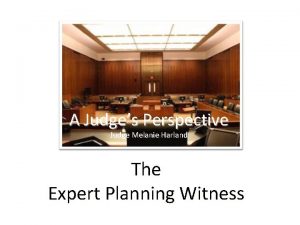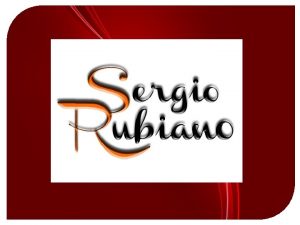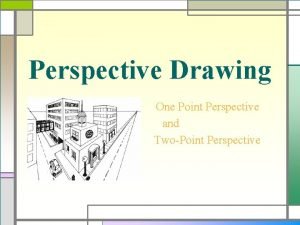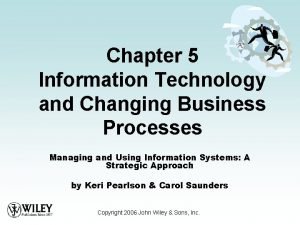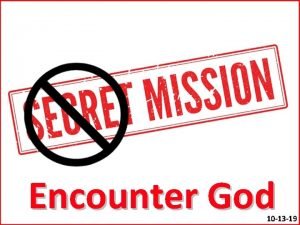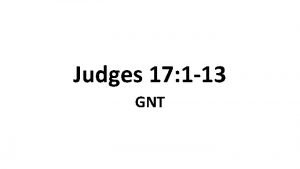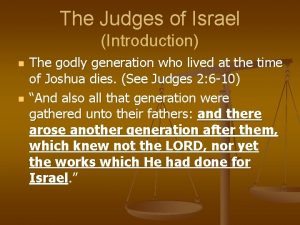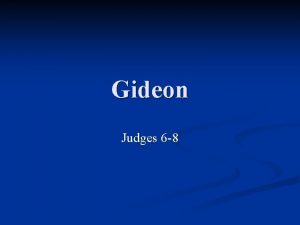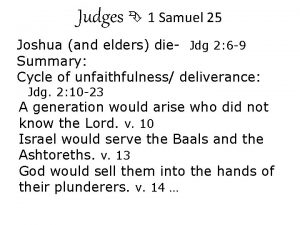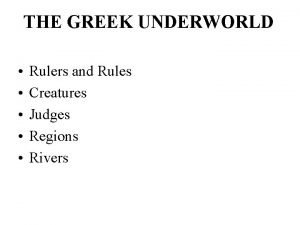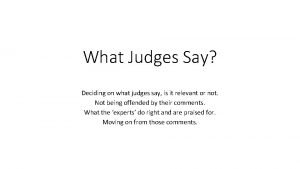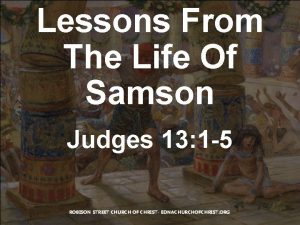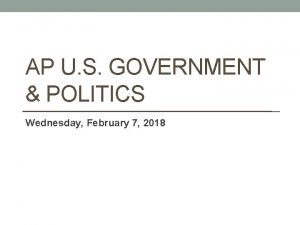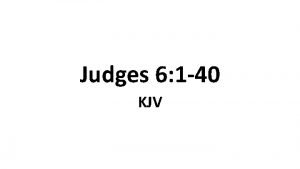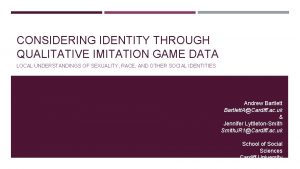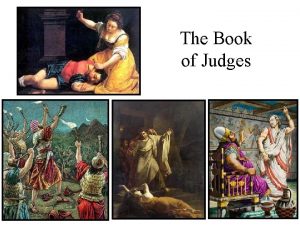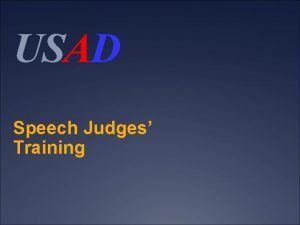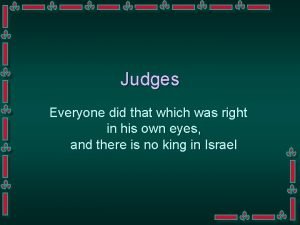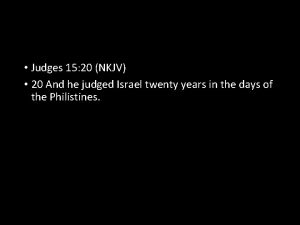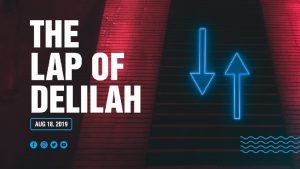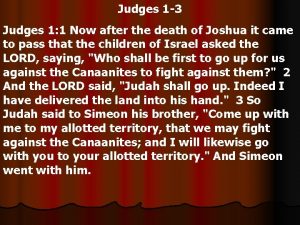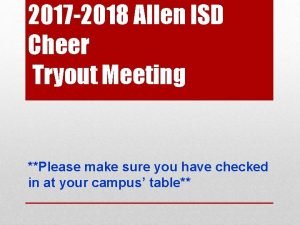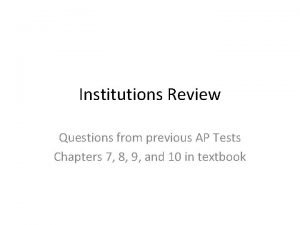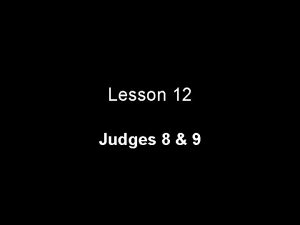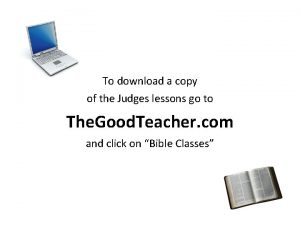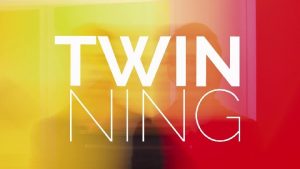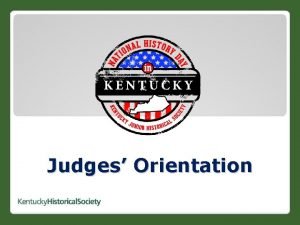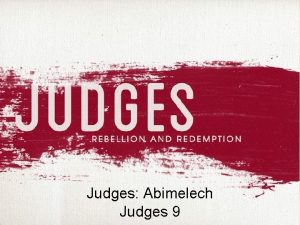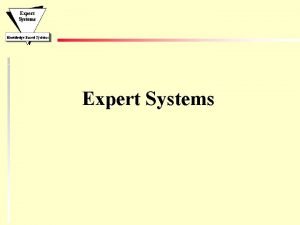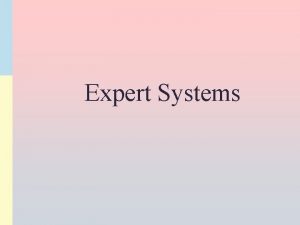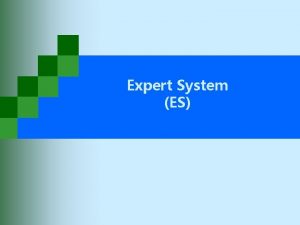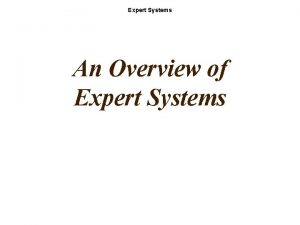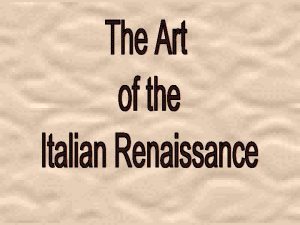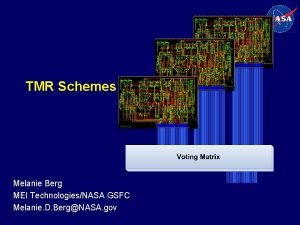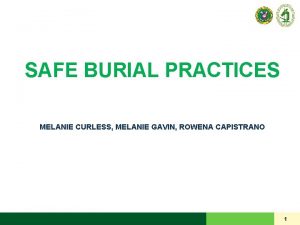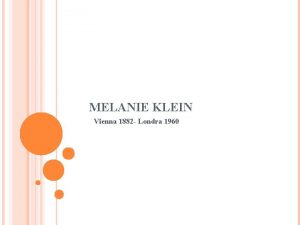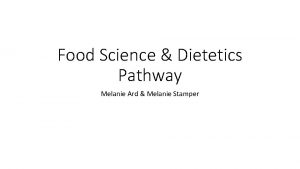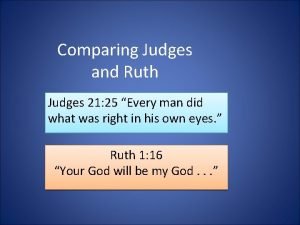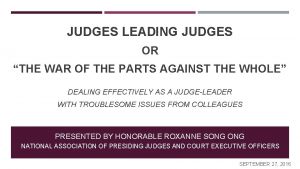A Judges Perspective Judge Melanie Harland The Expert







![“The function of the expert witness is to provide for [court] an expert’s opinion “The function of the expert witness is to provide for [court] an expert’s opinion](https://slidetodoc.com/presentation_image_h/3525eef25b16ae923e273dcb26885627/image-8.jpg)


























- Slides: 34

A Judge’s Perspective Judge Melanie Harland The Expert Planning Witness Judge Melanie Harland

Courts decide cases by applying the law to the evidence The law is the framework against which the evidence is tested; without evidence there is no case.

Part 1 Introduction to evidence concepts

In deciding whether to accept evidence, the Court considers whether it is: §Credible §Reliable §Persuasive

What is evidence? a) Fact • The evidence of a fact is one which tends to prove it • A fact is what is perceived with one of the five senses; what one sees, hears, touches, smells, tastes • Exhibits • Photographs • • Maps Scene diagrams • Graphs

What is evidence? b) Inferences • Definition An inference is a conclusion that is drawn from established facts (or from evidence that the Court has accepted as reliable) An inference is not a guess, but rather a logical deduction from such facts. • Drawing inferences from observed facts is the role of the tribunal of fact

What is evidence c) Opinion § Opinion evidence is the exception rather than the rule (s 32 Evidence Act) § Experts are able to give not only evidence of fact, but also opinion evidence
![The function of the expert witness is to provide for court an experts opinion “The function of the expert witness is to provide for [court] an expert’s opinion](https://slidetodoc.com/presentation_image_h/3525eef25b16ae923e273dcb26885627/image-8.jpg)
“The function of the expert witness is to provide for [court] an expert’s opinion as to the significance of, or the inference which may be drawn from, proved facts in a field in which the expert witness possesses special knowledge and experience going beyond that of the trier of fact. The expert witness is permitted to give such opinions for the assistance of the [court]. Where the question of one falls within the knowledge of experience of the triers of fact, there is no need for expert evidence and an opinion will not be received. ” R v Boland [1987] 2 SCR 398; (Mc. Intyre. J, SCt Canada)

Underlying the Rules are: The Evidence Act 2006 Section 276

The Evidence Act 2006 s 25 Admissibility of expert opinion evidence (1) An opinion of an expert that is part of expert evidence offered in a proceeding is admissible if the fact-finder is likely to obtain substantial help from the opinion in understanding other evidence in the proceeding or in ascertaining any fact that is of consequence to the determination of the proceeding. (2) An opinion by an expert is not inadmissible simply because it is about – (a) An ultimate issue to be determined in a proceeding; or (b) A matter of common knowledge. (3) If an opinion by an expert is based on a fact that is outside the general body of knowledge that makes up the expertise of the expert, the opinion may be relied on by the fact-finder only if that fact is or will be proved or judicially noticed in the proceeding. (4) …

The Evidence Act 2006 s 26 Conduct of experts in civil proceedings (1) In a civil proceeding, experts are to conduct themselves in preparing and giving expert evidence in accordance with the applicable rules of court relating to the conduct of experts (2) The expert evidence of an expert who has not complied with rules of court of the kind specified in subsection (1) may be given only with the permission of the Judge.

The Resource Management Act 1991 s 276 Evidence (1) The Environment Court may(a) receive anything in evidence that it considers appropriate to receive; and (b) Call for anything to be provided in evidence which it considers will assist it to make a decision or recommendation; and (c) Call before it a person to give evidence who, in its opinion, will assist in making a decision or recommendation…

The Resource Management Act 1991 s 276 Evidence (2) The Environment Court is not bound by the rules of law about evidence that apply to judicial proceedings.

What does the Court want? Section 120 Appeal • Background information • Description of the proposal • Description of the existing environment • Description of the permitted baseline – whether it should or should not be applied and reasons why • The statutory framework • Part 2 • Other relevant provisions of the Act • The relevant provisions of the applicable statutory instruments • Identify • The contested issues • The statutory provisions relevant to each issue • Conditions of consent

Where does assessment of effects fit in? Suggest: Take Care More subtle approach than before Council Why? Expertise of the Court Unnecessary repetition Suggest: Limit assessment to an analysis of how evidence of others meets the plan requirements Why? Less is more

What does the Court want? Plan Change Appeal • Background • Description of the Proposed Plan change • How it fits within the existing Plan framework • How it fit within the planning instruments • Identify the contested issues • Identify the relevant planning provisions that relate to each issue

Set out: Modelling (a) Whether the model has been subjected to credible, objective peer review (b) Comment on the quality of the data used (c) Evaluate the degree to which the model corresponds to the system being modelled (d) Outline what sensitivity testing has been done (e) Undertake an uncertainty analysis Read: “The resource consent process: Environmental Models and Uncertainty”; Mike Freeman, Principal Environmental Scientist, URS New Zealand; Resource Management Journal, August 2011

Part 2 How to prepare a brief of evidence

The process • Bundle of agreed planning provisions and Joint witness statements • Exhibits § Annexures must be clearly and easily identified • Conditions § Tracked version

The process A Judge will have directed a timetable for filing: • Who goes first? • Expert conferencing • Think about filing an agreed bundle of documents all witnesses will refer to • Before the hearing, the court will have read the evidence

Duty of Experts to Confer • Practice Note confers a duty on experts to confer with or without a facilitator • Are to confer in the absence of legal advisors and the parties • Are to try and reach agreement on matters in issue • Prepare and sign a joint witness statement stating: » The matters in which they agree » The matters on which they disagree and the reasons why • The joint witness statement is to be lodged with the court and served on all parties • Discussion of matters at conference not to be referred to at hearing

Duty of Experts to Confer

Some Cardinal Rules Avoid being an ADVOCATE Maintain your OBJECTIVITY Be INDEPENDENT AVOID unnecessary REPETITION

The Practice Note 2014 Paragraph 7. 3: (a) In any evidence given by an expert witness, that person must, in the witness’s statement or affidavit … or orally …: (i) acknowledge that he or she has read this Code of Conduct and agrees to comply with it; (ii) state the witness’s qualifications as an expert; (iii) describe the ambit of the evidence given and state either that the evidence is within his or her area of expertise, or that the witness is relying on some other (identified) evidence; (iv) identify the data, information, facts and assumptions considered in forming the witness’s opinions; (v) state the reasons for the opinions expressed;

… (vi) state that he or she has not omitted to consider material facts known to the witness that might alter or detract from the opinions expressed; (vii) specify any literature or other material used or relied upon in support of the opinions expressed; (viii) describe any examinations, tests, or other investigations on which she or he has relied, and identify, and give details of, the qualifications of any person who carried them out; and (ix) if quoting from statutory instruments (including policy statements and plans), do so sparingly. A schedule of relevant quotations may be attached to the statement of evidence, or a folder containing relevant excerpts may be produced. If the statutory instrument is included in a common bundle of documents, a cross-reference to this will suffice…

Briefs of evidence Purpose: • Tailor-made, not formulaic • Executive summary • No long quotes • Reference to Agreed Facts

Rebuttal evidence § Reply only § Use clear and concise language (avoid using jargon) Use acronyms sparsely Be succinct Do not use inflammatory adjectives

Part 3 The Environment Court hearing

• Ask for lawyer to brief you • Check out the layout of the Court beforehand • Remember it is a formal process

• Sit through other relevant evidence Note taking Cell phones Food & drink • Have your file in Court to refer to & take it to the witness box • Speak clearly and at a measured pace

How to deal with cross-examination • You are in control of your answers • Ask for your question to be repeated if you do not understand the question • Do not argue with counsel • Keep calm and carry on

Concurrent Evidence or “Hot. Tubbing” • Receiving evidence out of order • All experts of one discipline give evidence » at the one time, or » consecutively • Variations of the above

Single Expert In some Australian jurisdictions the starting point is a single expert » Chosen by negotiation of the parties, or » Chosen by the court Problems » Reduces the important principle that parties be entitled to have assertive and informed input into the selection of an expert » Can result in apparent unfairness

The Environment Court Remember a specialist court Consists of Judges and Commissioners appointed for their areas of expertise Address the Court as either: Your Honour and Commissioners or Members of the Court
 Melanie harland
Melanie harland Harland planes
Harland planes 2 point perspective stairs
2 point perspective stairs Silo perspective vs business process perspective
Silo perspective vs business process perspective Judges 13-16 lesson
Judges 13-16 lesson Judges 6 25-26
Judges 6 25-26 Proverbs 13 gnt
Proverbs 13 gnt Shagmar
Shagmar Judges 3:5-6
Judges 3:5-6 Gideon judges 6-8
Gideon judges 6-8 Judges 25
Judges 25 Underworld rulers
Underworld rulers What do judges do
What do judges do Judges 13 lesson
Judges 13 lesson The idea that judges ought to freely strike down
The idea that judges ought to freely strike down Judges 6 33-40
Judges 6 33-40 Judges 13:16
Judges 13:16 Judges 6:1-40
Judges 6:1-40 Judges 20 niv
Judges 20 niv Imgames
Imgames Judges 11:34-40
Judges 11:34-40 Questions about the book of judges
Questions about the book of judges Thank you speech for judges
Thank you speech for judges Judges everyone did what was right
Judges everyone did what was right Judges 20 nkjv
Judges 20 nkjv Line judge volleyball signals
Line judge volleyball signals Judges 13:1-5
Judges 13:1-5 Judges 1:3
Judges 1:3 Cheer judges score sheet
Cheer judges score sheet Congress is most likely to exert oversight
Congress is most likely to exert oversight Judges 8 lesson
Judges 8 lesson Judges of israel chart
Judges of israel chart Judges 7:15-21
Judges 7:15-21 Judges 10 1
Judges 10 1 Q and a criteria for judging
Q and a criteria for judging
